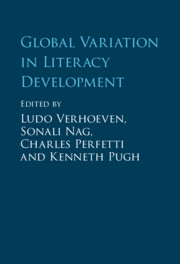Book contents
- Global Variation in Literacy Development
- Global Variation in Literacy Development
- Copyright page
- Contents
- Figures
- Tables
- Contributors
- Abbreviations
- 1 Introduction
- Part I Regional Variations
- Part II Neurobiological and Ecological Markers
- 11 Writing Systems and Global Literacy Development
- 12 Brain Foundations for Learning to Read
- 13 Genetics and Literacy Development
- 14 Role of Self-Regulation in the Transition to School
- 15 Socioeconomic Status, Sociocultural Factors, and Literacy Development
- 16 Sensitivity to Contextual Factors in Literacy Interventions in the Global South
- 17 How Teachers Contribute to Children’s Literacy Success
- 18 The Literacy Ecology of the Home
- 19 Parental Literacy Support in Monolingual and Bilingual Contexts
- 20 Global Literacy
- Index
- References
20 - Global Literacy
Patterns and Variations
from Part II - Neurobiological and Ecological Markers
Published online by Cambridge University Press: 23 November 2023
- Global Variation in Literacy Development
- Global Variation in Literacy Development
- Copyright page
- Contents
- Figures
- Tables
- Contributors
- Abbreviations
- 1 Introduction
- Part I Regional Variations
- Part II Neurobiological and Ecological Markers
- 11 Writing Systems and Global Literacy Development
- 12 Brain Foundations for Learning to Read
- 13 Genetics and Literacy Development
- 14 Role of Self-Regulation in the Transition to School
- 15 Socioeconomic Status, Sociocultural Factors, and Literacy Development
- 16 Sensitivity to Contextual Factors in Literacy Interventions in the Global South
- 17 How Teachers Contribute to Children’s Literacy Success
- 18 The Literacy Ecology of the Home
- 19 Parental Literacy Support in Monolingual and Bilingual Contexts
- 20 Global Literacy
- Index
- References
Summary
In this final chapter, a wide-angle perspective is provided on the major issues that arise when one thinks globally about literacy. Despite many important differences across the globe, literacy development suggests some general patterns that reflect nearly universal phases and shared operating principles. Although the “development” of literacy begins early through natural processes of language development and conceptual development, it is school experiences, explicitly designed to teach reading, that we expect to ensure the achievement of literacy. Each classroom within a school is its own literacy ecosystem, with one or more teachers, students, literacy curriculum materials, assesments, and regulated interactions. The classroom itself is embedded within other systems – the school, the community, the larger school administrative units, and local, regional, and national government control agents. A Global Literacy Framework is presented, showing that literacy development is embedded in language development and can be predicted by (a) system factors, referring to variations in the linguistic and writing systems, (b) child factors, associated with the neurobiological foundation of children’s learning capacity, and (c) support factors, associated with processes in the home and at school. All these influences exist within a sociopolitical context that exerts influence broadly across the system.
Information
- Type
- Chapter
- Information
- Global Variation in Literacy Development , pp. 446 - 468Publisher: Cambridge University PressPrint publication year: 2023
References
Accessibility standard: Unknown
Why this information is here
This section outlines the accessibility features of this content - including support for screen readers, full keyboard navigation and high-contrast display options. This may not be relevant for you.Accessibility Information
- 1
- Cited by
